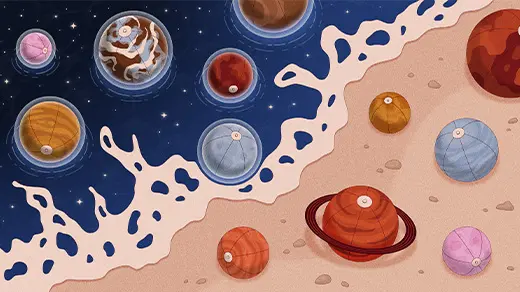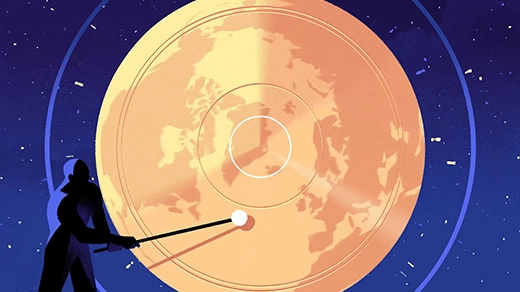What's up in
Planetary science
Latest Articles
The Road Map to Alien Life Passes Through the ‘Cosmic Shoreline’
Astronomers are ready to search for the fingerprints of life in faraway planetary atmospheres. But first, they need to know where to look — and that means figuring out which planets are likely to have atmospheres in the first place.
How Will We Know We’re Not Alone?
The first planet beyond our solar system was identified just 30 years ago. Since then, thousands have been found and characterized. As we look for more, exoplanet experts are also probing for signs of alien biospheres hundreds of light-years away. In this episode, co-host Janna Levin speaks with astrophysicist and astrobiologist Lisa Kaltenegger about how we’ll know we’re not alone in the cosmos.
The Search for What Shook the Earth for Nine Days Straight
Last year, an immense but brief outburst of seismic energy was soon followed by a long hum that made the world ring. Finding its cause took 68 scientists and an assist by the Danish military.
Geometers Engineer New Tools to Wrangle Spacecraft Orbits
Mathematicians think abstract tools from a field called symplectic geometry might help with planning missions to far-off moons and planets.
How the Ancient Art of Eclipse Prediction Became an Exact Science
The timing of the total eclipse on April 8, 2024, will be known to within a second, thousands of years after fearful humans first started trying to anticipate these cosmic events.
Doubts Grow About the Biosignature Approach to Alien-Hunting
Recent controversies bode ill for the effort to detect life on other planets by analyzing the gases in their atmospheres.
New Clues for What Will Happen When the Sun Eats the Earth
Recent observations of an aging, alien planetary system are helping to answer the question: What will happen to our planet when the sun dies?
Rogue Worlds Throw Planetary Ideas Out of Orbit
Scientists have recently discovered scores of free-floating worlds that defy classification. The new observations have forced them to rethink their theories of star and planet formation.
The Scientist Who Decodes the Songs of Undersea Volcanoes
In the rumbles and groans of underwater volcanoes, Jackie Caplan-Auerbach finds her favorite harmonies — and clues to the Earth’s interior.








